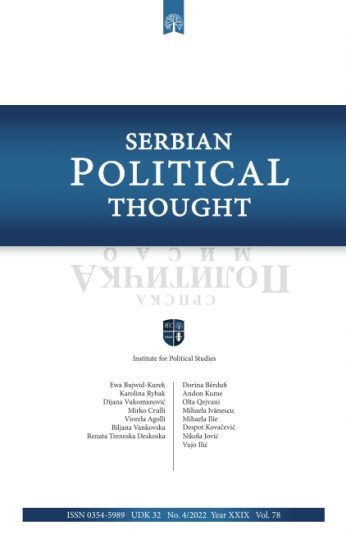Main topic
spt1/2016
Disraeli’s Orientalism Reconsidered
Abstract
In his influential Orientalism Edward Said placed British statesman and writer Benjamin Disraeli (1804-1881) in the long line of the Western writers who cultivated particular stereotypes about the Muslim East, with the hidden intention of imperial subjugation. On the other side, Said’s critics Patrick Brantlinger and Mark Proudman asserted that Disraeli was not an Orientalist, but rather an admirer of the Arabic and Ottoman civilizations and determined defender of the Ottoman Empire. However, Disraeli’s novels, correspondence and his policy in the Great Eastern Crisis give more complex evidence, which does not support any of these views. This paper emphasises the point that during his long career Disraeli was changing his views of the Turks and the Ottoman Empire, which even Patrick Brantlinger’s balanced approach to the issue of Disraeli’s Orientalism misses.
References
Unpublished Sources
- Disraeli Papers, Disraeli’s Correspondence 1864–1881, Lord Beaconsfield – Lord Derby, Hughenden, 4 September 1876.
- Disraeli Papers, Disraeli’s Correspondence 1864–1881, Lord Beaconsfield – Lord Derby, Hughenden, 29 September 1876.
- Disraeli Papers, Disraeli’s Correspondence 1864–1881, Lord Beaconsfield – Lord Derby, Hughenden, 30 September 1876.
Published Sources
- Disraeli, B. (1927a) Contarini Fleming. A Psychological Romance. The Bradenham edition of the Novels and Tales of Benjamin Disraeli, 1st Earl of Beaconsfield, vol. IV, London: Peter Davies.
- Disraeli, B. (1927b) Alroy. The Bradenham edition of the Novels and Tales of Benjamin Disraeli, 1st Earl of Beaconsfield, vol. V, London: Peter Davies.
- Disraeli, B. (1904) Coningsby or, The New Generation. New York, The Century co.
- Disraeli, B. (1927d) Lothair. The Bradenham edition of the Novels and Tales of Benjamin Disraeli, 1st Earl of Beaconsfield, vol. XI, London: Peter Davies.
- Disraeli, B. (1927c) Tancred, or The New Crusade. The Bradenham edition of the Novels and Tales of Benjamin Disraeli, 1st Earl of Beaconsfield, vol. X, London: Peter Davies.
Secondary Sources
- Arendt, H (1994) The Origins of San Diego, New York and London: A Harvest Book (first edition 1951).
- Bakić-Hayden, M. and Hayden, R. M. (1992) “Orientalist Variations on the Theme ‘Balkans’: Symbolic Geography in Recent Yugoslav Cultural Politics”. Slavic Review 51 (Spring), 1–15.
- Berlin, (1981) “Benjamin Disraeli, Karl Marx and the Search for Identity”. In: Berlin, I., Against the Current: Essays in the History of Ideas. Oxford: Oxford University Press (first edition 1979). pp. 252–286.
- Blake, R. (1982) Disraeli’s Grand Tour: Benjamin Disraeli and the Holy Land 1830-31. New York: Oxford University Press.
- Brantlinger, (1998) ‘Disraeli and Orientalism’. In: Richmond, C. and Smith, P. (eds.) The Self-Fashioning of Disraeli 1818–1851. Cambridge: Cambridge University Press. pp. 98–105.
- Endelman, M. (1985) ‘Disraeli’s Jewishness Reconsidered’. Modern Judaism, 5–2: 109–123.
- Endelman, M. (1998) “’A Hebrew to the end’”: The Emergence of the Disraeli’ Jewishness’. In: Richmond, C., Smith, P. (eds.) The Self-Fashioning of Disraeli 1818–1851. Cambridge: Cambridge University Press. pp. 106–130.
- Endelman, M., Kushner, T (eds.) (2002) Disraeli’s Jewishness. London and Portland: Valentine Mitchell.
- Fleming, K. E. (2000) “Orientalism, the Balkans, and Balkan Historiography”, American Historical Review 105/4: 1218–1233.
- Glassman, (2003) Benjamin Disraeli: The Fabricated Jew in Myth and Memory. New York and Oxford: University Press of America.
- Goldsworthy, V. (1998) Inventing Ruritania: The Imperialism of the Imagination. New Haven and London: Yale University Press.
- Hammond, A. (2004) “The Uses of Balkanism: Representation and Power in British Travel Writing 1850-1914”. The Slavonic and East European Review, Vol. 82, No. 3 (Jul): 601-624.
- Kirsch, (2008) Benjamin Disraeli. NewYork: Nextbook and Schocken.
- Ković, M. (2011) Disraeli and the Eastern Question. Oxford: Oxford University Press.
- Monypenny, W. F., and Buckle, G. E. (1929a-1929b) The Life of Benjamin Disraeli, Earl of Beaconsfield I–II. New York: The Macmillan Company.
- Proudman, M. F. (2005): “Disraeli as an ‘Orientalist’: The Polemical Errors of Edward Said”, The Journal of the Historical Society, 5–4: 547–568.
- Rather, J., (1986) “Disraeli, Freud, and Jewish Conspiracy Theories”. Journal of the History of Ideas, 47–1: 111–131.
- Ridley, J. (1995) Young Disraeli 1804–1846. New York: Crown Publishers. Inc.
- Said, E. (2003) Orientalism. London: Penguin Classics.
- Skopetea, E. (1991) “Orijentalizam i Balkan”. Istorijski časopis, 38: 131–143.
- Sultana D. (1976) Benjamin Disraeli in Spain, Malta and Albania 1830-32: A Monograph. London: UK Tamesis Books Limited.
- Šijaković, B. (2004) A Critique of the Balkanistic Discourse: Contribution to the Phenomenology of Balkan Otherness. Toronto: Serbian Literary Company.
- Todorova, M. (1997) Imagining the Balkans. New York and Oxford: Oxford University Press.
- Weintraub, (1993) Disraeli: A Biography. London: Dutton Adult.
- Wohl, S. (1995) “’Dizzy Ben Dizzy’: Disraeli as Alien”. The Journal of British Studies, 34–3: 375–411.

